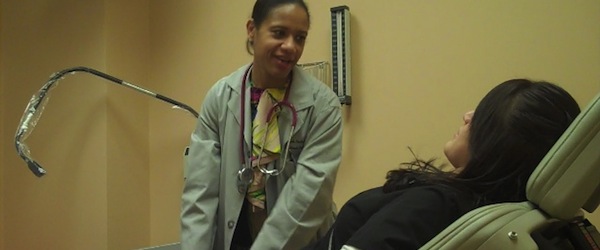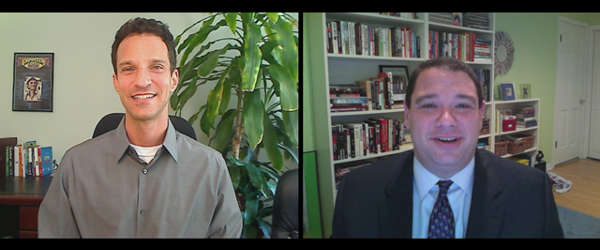Choosing a college or university is no easy task. There are thousands to choose from in the U.S. alone. To find a college match, there are many factors you should consider. In today’s online career advice, we explore those factors via a video interview with certified career coach Grace Moniz of Los Angeles, CA.
Today’s Guest
 Grace Moniz: Founder of Career Insights
Grace Moniz: Founder of Career Insights
Grad Degree: Currently earning a Master’s in Organizational Leadership
Grad School: Norwich University in Northfield, VT (online degree program)
College Major: Business Administration and Human Resources Management
College: Cal State University, Long Beach in Long Beach, CA
College: Spent 2 years at Mt. St. Mary’s College in LA, CA before transferring
High School: Bishop Montgomery High School in Torrance, CA
SNEAK PEEK (Full Episode + Transcript below)
|
RELATED VIDEOS |
Find the Right College For You
Grace shares great professional career advice to help students and parents in choosing the right college. From figuring out what environment and activities you want at your college campus to assessing your strengths and interests with your high school counselors, teachers or private consultants to determine what careers and majors might fit you, Grace provides many great suggestions. She also shares the important reminder to have the financial discussion as a family so you can determine which schools fit your budget and then plan for any financial aid, scholarships or work-study programs that you may need.
In addition to the great college search help that Grace provides in the videos, she also suggests some helpful resources. Grace recommends visiting the CollegeBoard website and reading the Fiske Guide to Colleges 2011 (which you can purchase on Amazon via this affiliate link). I hope all of this advice helps you! I couldn’t be happier with my college choice – the University of Michigan – but I can’t say I went about the selection process the right way. I was actually crazy enough to toss some college applications in the trash because the schools wanted more than one essay submitted (Emory, Tulane)! What was I thinking? I actually allowed one day of teenage laziness to determine much of my future! Do yourself a favor and listen to Grace. Let us know in the Comments if this has been helpful for you!
FULL EPISODE
For our Audio Podcast: Careers Out There on iTunes
TRANSCRIPT OF TODAY’S INTERVIEW
Professional Career Coach Grace Moniz: Thank you Marc. I’m happy to be here.
Careers Out There Host Marc Luber: Excellent. So Grace, you talk about this topic all the time. Tell us this – if I’m in high school right now, what are the first things I should be doing to figure out what college to go to?
Professional Career Coach Grace Moniz: One of the first steps, I think, is to figure out what it is that you want from the college experience. So begin exploring: what’s the environment like, what are the kinds of things that you want to do initially beyond academics – you know – do you want a large school, small school? So you can obviously go online and check out a lot of the schools there. You can also visit schools, which I highly recommend – you get an assessment and you get a feel for different campuses – you’ll see how wide and varied they are. The next step I would take would be to begin assessing yourself and who YOU are. What are your interests? What are your strengths? What are the things that motivate you? And then if you can begin to know yourself, you have the ability to make better decisions for yourself. And the next step that would then follow with knowing yourself would be what type of career paths might you want to follow? It’s not that you have to decide on a particular career – and certainly, this generation will have 7-8 different careers or beyond in their own lives.
Host Marc Luber: Let me stop you there – let me interrupt. Because you said that people should get to know themselves. What’s the best way for them to really get to know themselves and figure out what their strengths and interests really are?
Career Coach Grace Moniz: There are a number of ways to do that. Just simple reflection and exploration – as you reflect back to “what are the things I have fun doing?” Do I like working in groups, do I like working with numbers, do I like working on my own independently? You can do formal assessments. There are a number of assessments out there. Career coaches, career counselors and consultants can help you and through those assessments help provide that clarity. So another option is to check in with your teachers and with your school counselors. Your high school actually might offer some of these assessments. And your teachers and counselors have really good insight into you and what they may perceive as your strengths. So checking in and even asking your parents, “what do you see are my strengths – what is the kind of environment that you think I might work best in?” And they can help you ask a lot of questions and help you with that process in figuring out who you are and what you do. Because knowing that, you have [Skype issue….] now but the rest of your life that are appropriate for you. It may not be the right choice for somebody else but they’re gonna be the right choice for you.
Host Marc Luber: Yeah – and I like that about asking the teachers. Because your teachers do know you really well. We just had a guest here on Careers Out There who’s a journalist. She writes for the Los Angeles Times and she’s under journalism careers here on the site for people who want to check it out. Her name is Maria Elena Fernandez. She talks about how she wasn’t going to be a journalist at all in college! She was going down another path that she thought was the right path for her. She was struggling, her grades weren’t that good, she wasn’t that happy – and a teacher pulled her aside one day and said “you’re a great writer – you should really consider a writing major and a writing path.” She switched her major to journalism and she’s had a 21 year career working at the top newspapers in America! So it’s pretty cool how listening to feedback can really help you!
Grace Moniz: I think teachers have a great insight into their students. Most teachers have a very caring nature and will want to share that with the students. They could be very motivational.
Luber: Yeah. It’s excellent! So you figure out your strengths and you assess all of this – then it could help you get some direction. And then what do you do with that, once you’re honing in on that direction?
Grace: Once you have a set of where you might like to go, what your strengths are, NOW you get to explore and talk to people and network. Soliciting parents and teachers, the parents of your friends – who do they know who is a psychologist? Who do they know who is a civil engineer? Who do they know that is XYZ profession that you can meet with them, job shadow them….that will begin to affirm your own career direction and give you a sense of wow – [Skype issue] – there’s no way I would ever be sitting in front of a computer in a cubicle all day long – this is not the career path for me. Both pieces are valid information. Another benefit of this networking is that you have that opportunity to build relationships with people which potentially could lead to internships and part-time work down the road, which again is another avenue for honing in as to what it is that you might like to do. Once you know the potential career paths, and I’m not talking about a specific job, I’m talking about career paths – directions – like “gosh, I think I might like to be maybe a psychologist or an attorney or maybe a social worker” – and as you’re beginning exploring that, one of the majors that comes up for me is psychology. If you major in psychology, it’s a direct link to any of those career paths. So understanding your career paths, you can now look and say “what majors do I want?” And from those majors, as you begin researching colleges that have that acapella singing group or the sports strength, you can also find out – do they have the majors that I want to major in? And that’s really key to selecting a college.
Luber: And what if I just have no idea career wise? I think I kind of know that I’m good at this or I’m good at that, but I really don’t know what I want to do. I’m kind of just looking forward to getting out there, getting away from my parents and partying and figuring it all out once I’m there. What then should I kind of look at to figure this out?
Grace: OK, so keep in mind – there’s over 3,000 colleges and universities throughout the U.S. So because of that there’s going to be quite a few that are going to be right for you. And there are even colleges out there – their preference is that you DON’T know what your major is. Their preference is that you come explore – we don’t expect you to know what you want to do – just [Skype issue] – have you take a variety of classes to get a taste of this and a taste of that and we’ll work with you. One of these universities is the University of Colorado at Boulder. It’s the one that my youngest daughter went to. She wasn’t sure what she wanted from a career standpoint but from an environment, a large school, having it outdoors, a lot of outdoor activity, having a school that’s filled with sororities and fraternities (even though she’s not participating in one), that was something that was very motivational for her. She found the right fit – she’s thriving, she’s started her second year in college and she’s identified a career path for herself. So you don’t HAVE to know. Now, there may be some careers in which it’s really beneficial to know – and that example would be engineering. If you want to become an engineer, think you want to become an engineer, many of the colleges prefer that you apply to the school of engineering of the school of your choice and you’re accepted to that in addition to the school itself. You’ll often find that if you don’t start as an engineer, it’s really difficult to transfer into the engineering program later. So there are some career paths that lend themselves to knowing exactly what you want to do before you start college. And then there are other colleges that say “come with an open mind and we’ll figure out when you get here.”
Luber: Yeah – and kids in high school should know too that it helps if you can figure some of these things out so that you don’t waste time at college – because it costs money and it goes really fast. It goes by fast! So if you can kind of get some focus earlier in life, it helps.
Grace: I think so. A lot of parents have asked me about doing assessments and my feeling is that if through assessments it helps your son or daughter figure out and clarify a little bit more directly what their path is, [Skype issue] it could be beneficial. The institution data came out with some research that they had done and less than 35% of college students graduate in 4 years. I have 4 children and let me tell you – the goal was to get through in 4 years! So I wanted to provide as many resources as possible.
Luber: That makes sense. What about this – what if I’m thinking – I’m in high school – all my friends are going to this school or that school. Shouldn’t I just
go where my friends are because I know I’m gonna have fun and I’ll have support?
Grace: Sure! Wow – sure they can – but is that school the right school for them? A school that their friend goes to – a friend may want something that’s very small or very quiet – and yet they themselves might be somebody who is more vivacious and wants a bigger environment. I think at this stage it’s really key to go to a school that’s really the right fit for you personally. And [Skype issue] people and friends you’re gonna meet at this new school environment. And surprisingly, you may end up at the same school. But I think to make a choice based on what someone else is doing might be frustrating for you or for the individual.
Luber: OK Grace so tell me this- I’m in high school – I’m worrying about this. What’s more important? My grades, my SAT scores, those essays I write on the applications or my extracurricular activities? What should I be worried about?
Grace: You know that depends on you and that depends on the school. I think from the college’s perspective, the colleges know the right mixture – the right combination of student that really fits well with them. They know which student is gonna be successful and every college is gonna be different. Some will maybe weigh more heavily on SAT scores, others on extracurricular, others on a combination. I think what you need to do is really look from your own self and say “what school is appropriate for me?” So if, on average, your SAT scores let’s say is 550, and you’re looking at colleges where the average math or English score is 700, if you really like a high challenge, that might be a good fit for you. However, you might have a need for feeling successful and might want to find a school where SAT ranges are anywhere between 400-600, more appropriate to where you are so it’s a better fit. So conversely, if the scores are too low and your score is much higher than the average scores of the students at the school, you might be bored and feel that you’re unchallenged. So take a look at yourself – what is the right fit for you? There are plenty of schools out there that will be just a good fit.
Luber: Excellent. So as a career coach, people can turn to you for help – who do you recommend people that are in high school turn to to figure these things out?
Grace: Well I think, as mentioned earlier, there are career counselors at high schools as part of the high school team – those that are specifically targeting and help seniors with their college applications and the college process. Your teachers are a great resource of referral. Career coaches can focus on the – what is the right career for you – they can help you target your interest and strengths and careers. There are also college counselors and college coaches and consultants – they’re experts at really knowing quite a few of the schools. They will have visited the schools, they will have researched the schools, they can help you find a best-fit school as well. So if you don’t have the resources available at your high school, you might consider partnering with a college counselor or a college coach who could help you in that vein.
Luber: So a college counselor or coach – that’s a private person? They’re not at a college campus – it’s someone who’s an individual consultant like yourself?
Grace: Yes – there are individual consultants who specialize in the entire application process – from identifying the college that’s the best fit for you to coaching you or working with you on the essays and the entire application process if you’d like to do that – yes they do.
Luber: Excellent. OK – so for people who don’t have those resources at their school or they’re clashing with whoever’s at their school, there are other ways – other people to turn to.
Grace: Exactly. And the College Board and the internet is a tremendous source of information as well. You may be able to run through the catalogs that are at your high school in the counseling office. There are college catalogs there, but certainly the internet – and going on to College Board – and the websites of all of these campuses are a tremendous resource. A fun book that I refer clients to is the Fiske Guide To Colleges. It’s F-I-S-K-E. They actually send people out to these campuses. They’re interviewing the students, they’re interviewing the teachers, they get the real low-down on the school, not just what’s in the marketing hype.
Luber: That’s great – I’ll put the link to that on the page there so everyone could check it out. So we’ve covered looking into the academics, looking into yourself, looking into visiting the school, networking with people to hear both face-to-face and through the social networks to check out what the place is all about, the Fiske guide, talking to your parents, your teachers, your counselors…..What about money? School’s not usually free. School costs money. How should a student approach that situation?
Grace: I think students should find out first and foremost from their parents what it is that the parents can afford. What kind of financial assistance will the parents provide? And be realistic about that. Because it may mean that you as a student will choose to go to a school and yet you do so knowing that you’re gonna have to take a loan out or you’re gonna have to get grants or participate in a work-study program, whatever it may be. But NOW you’re armed with information and knowledge and as you research, you can make appropriate decisions – and you can also know that part of that job search process is going to be spending time applying for scholarships, grants and loans.
Luber: What about if I’m a parent watching this video right now? If I’m the parent of a kid in high school, what should I be thinking about?
Grace: My children will laugh because I’m giving this advice – but don’t nag them. I think from a student’s standpoint, know that your parents love you. They’re worried about you, they’re worried about this process, they really want your success – so what may appear as nagging to you is really concern. And for parents, I would say ask a lot of open-ended questions. Sit back and explore what it is – if they say gee, they might want this career or this particular college, ask them open-ended questions. “What is it about that college that you like? What is gonna motivate you to go to that college or take that career path?” Ask those questions – again, you’re there to assist them in defining what it is that’s gonna be good for them. It’s gonna be their decision. It’s their life, and they’re gonna have to live it. You’re gonna create the parameters regarding the financial parameters, but it is for them. So ask a lot of open-ended questions, you sort of want to check to see if they’re on target, but most of them are. So students – knowing that your parents love you and are worried about you, preempt their concern by being forthcoming with information and saying, “Hey mom, I’ve got it handled – I’m gonna be taking the SATs on these dates, I’m gonna be drafting my applications on these dates, I’ve selected the colleges, I know exactly what I’m doing and when I’m doing it – I’m OK, I’m good to go.” So be forthcoming with information for your parents and they won’t have a need to nag.
Luber: This is all great stuff, Grace. Tell us this – is there a summary you could give us? An action plan for everybody to grab and run with?
Grace: I think an action plan is specifically – once you’ve figured out what you want to do and you have narrowed your college choices down, if you have an opportunity, go ahead and go visit those college campuses. Get on site if you can. You don’t have to do this before you apply, but it would be helpful. If you do go on campus, let the Admissions Office know that you’re there. Let them know that you’ve come on campus because I think that that gives you a little boost in the admissions process. As you visit the campuses and you take tours with other potential students, you’re gonna get a sense of is this the right fit – are these my people – do I easily connect to them? In addition to looking around saying gosh, is this the environment I want to spend the next 4 years of my life? Is this really a good fit for me? Ultimately, you’re going for fit.
Luber: Excellent. I couldn’t have been happier with my fit at Michigan. I definitely recommend visiting the school. It’s a very big, big part of the whole process so that’s very good advice. Everyone – as always, you get real advice from real professionals here like Grace Moniz. Grace – thank you so much for taking your time today.
Grace: Thank you for having me! I love to help.
Luber: Excellent. You guys, leave your feedback on the Comments section on the site. We want to hear from you – we want to make sure we’re helping you and getting you all the information you need. So whether you’re a student or a parent who watched this video, leave your feedback. We definitely want to help you out. So thank you again for watching everybody. I look forward to seeing you again soon. I’m Marc Luber and take care.
(C) 2010 Careers Out There
RELATED POSTS
Choosing A College Major (video)
How To Discover Your Strengths To Find A Career Fit (Interview)
15 Career Development Topics That Will Follow You Through Life








Great post – love the video! Another great resource is Erin Avery – http://www.averyeducation.com. She also developed the Collegeapp for iphone. >>http://itunes.apple.com/us/app/collegeapp/id358556245?mt=8 – great for students these days. Hope this is helpful. Good luck!
Thanks for posting Elena. Erin’s site looks good.
This is great advice!
Thanks for the feedback Rachel! Yeah, I think Grace shared some solid advice there.
i like it wat if people want to apply to a school and there prance are not there do they stil ned to paye to the school.
Hi @saragamal, not sure what you’re asking but it sounds like you’re asking whether you have to pay for college if you don’t have parents? You would need to research how things work in whatever country you’re writing from and see what type of financial aid is available. Good luck.